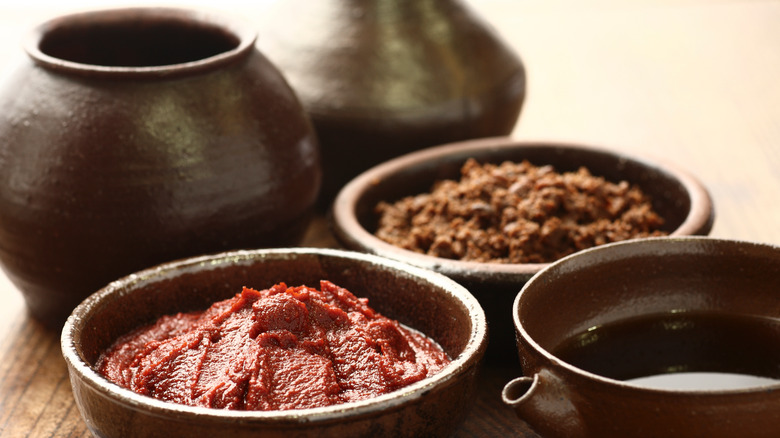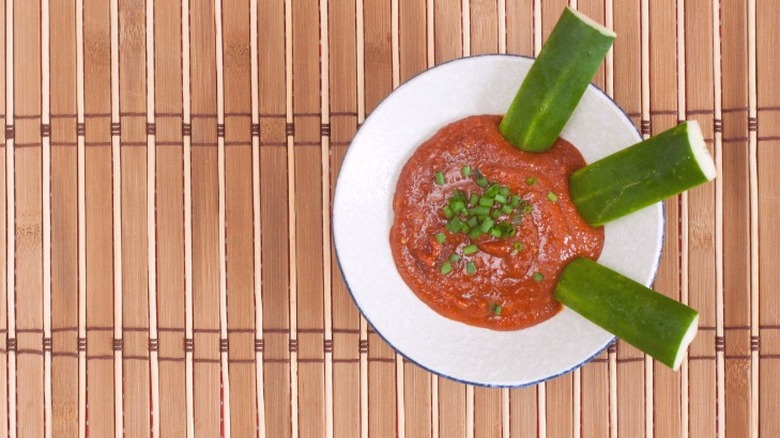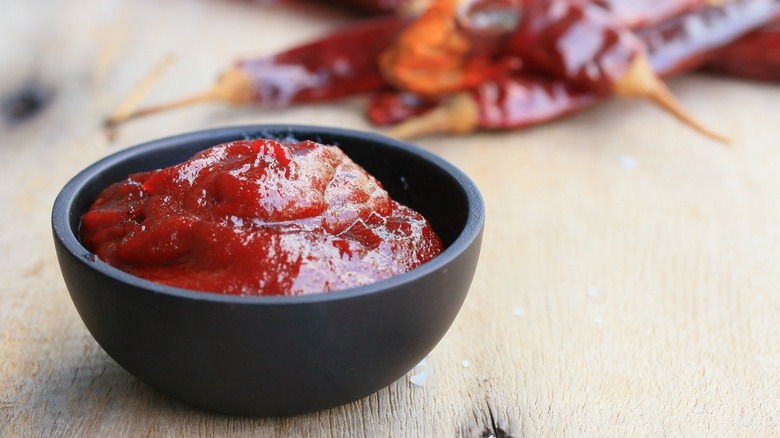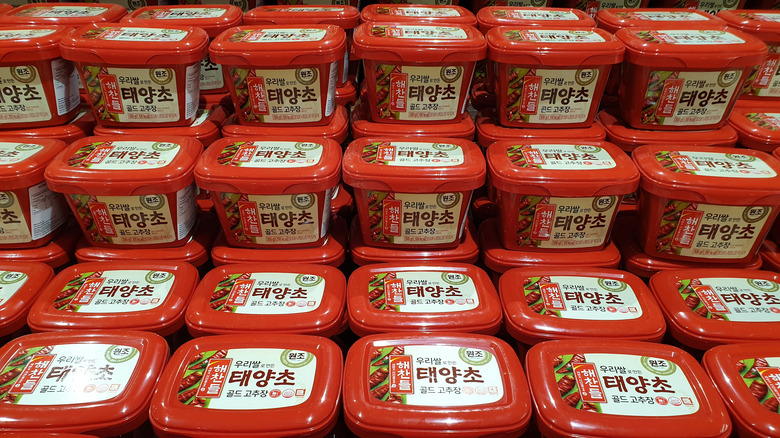The Real Difference Between Ssamjang And Gochujang
If you're confused about the difference between ssamjang and gochujang, you are not alone, and once you learn more about how they're made, it is easy to understand why. Cuisine Vault explains that both Korean barbecue sauces are made with similar ingredients and can be used interchangeably. In fact, the outlet says that an unaccustomed palate usually cannot taste the subtle nuances that differentiate the two condiments, and that one sauce could certainly fill in for the other in any recipe.
That being said, ssamjang and gochujang are definitely not the same. The breakdown can be a little confusing, but basically, all ssamjang paste contains gochujang paste — and gochujang does not contain ssamjang.
Two specific qualities appear to distinguish these very similar pastes from one another: recipes for ssamjang seems to offer more versatility than the traditional recipe for gochujang, and gochujang generally has more of a bite compared to the umami flavor of ssamjang (via Cuisine Vault).
One of the main ingredients in ssamjang is gochujang
As we delve into the characteristics of ssamjang (ssam: "to wrap," jang: "paste"), you should know that this sauce can contain a long list of ingredients and gochujang is always one of the most prominent.
Cuisine Vault reports that the primary components of ssamjang are an even ratio of spicy, almost "meaty" gochujang combined with doenjang (via Chicago Tribune) — a fermented soybean paste that tastes similar to miso. A little sesame oil is blended in to finish off the thick, savory condiment, and then the extra spices added are up to the chef.
Recipes for ssamjang vary considerably due to the numerous possible additions. Depending on the desired flavor profile, many sources suggest rounding out ssamjang paste with ingredients such as anchovy, dried shrimp, brown sugar (via Cuisine Vault), garlic, sauteed mushrooms, tofu (via Chow Divine), minced onion (via My Korean Kitchen), or chopped scallion.
Both give a flavorful zip to traditional Korean dishes
Gochujang (gochu: "chili pepper," jang: "paste") is, as the translation suggests, a smooth, quite spicy concoction of fermented chili paste mixed with salt and rice powder. Cuisine Vault reports that it makes a fantastic meat marinade or can add depth to stews or soups. However, the most common way in which to enjoy gochujang is as a condiment on bibimbap, "Korea's national rice dish." The flavorful meal consists of rice, kimchi, sliced veggies, and soy sauce as well as diced beef or pork and a fried egg, all accompanied by hot and slightly sweet gochujang.
Ssamjang is the pungent, salty star of a popular Korean street food called Ssam. Rice and little chunks of barbecued meat are enveloped in lettuce or cabbage, then drizzled or dipped in piquant ssamjang. If you're feeling a little adventurous, Cuisine Vault also likes the idea of using ssamjang as a dip for fried octopus. Yum.
Ssamjang and gochujang are easy to find
The Chicago Tribune and My Korean Kitchen say that containers of ssamjang and gochujang are readily available online and at local Asian markets. According to "Korean BBQ" cookbook author Bill Kim, gochujang is a complex, labor-intensive sauce and extremely time-consuming. He suggests purchasing gochujang as opposed to going through the difficult process of making it in your own kitchen (via Chicago Tribune).
On the other hand, the consensus from Cuisine Vault and My Korean Kitchen seems to be that ssamjang is easy to concoct at home — one of the primary benefits being that doing so allows one to tailor the taste to individual preference. Using the store-bought building blocks of gochujang and doenjang is a great head start, and the rest of the ssamjang can be prepared in no time at all.
Whether the recipe calls for sweet and spicy gochujang or salty ssamjang, either will do in a pinch — but now you know how this pair of delicious Korean barbecue sauces actually differ from one another.



